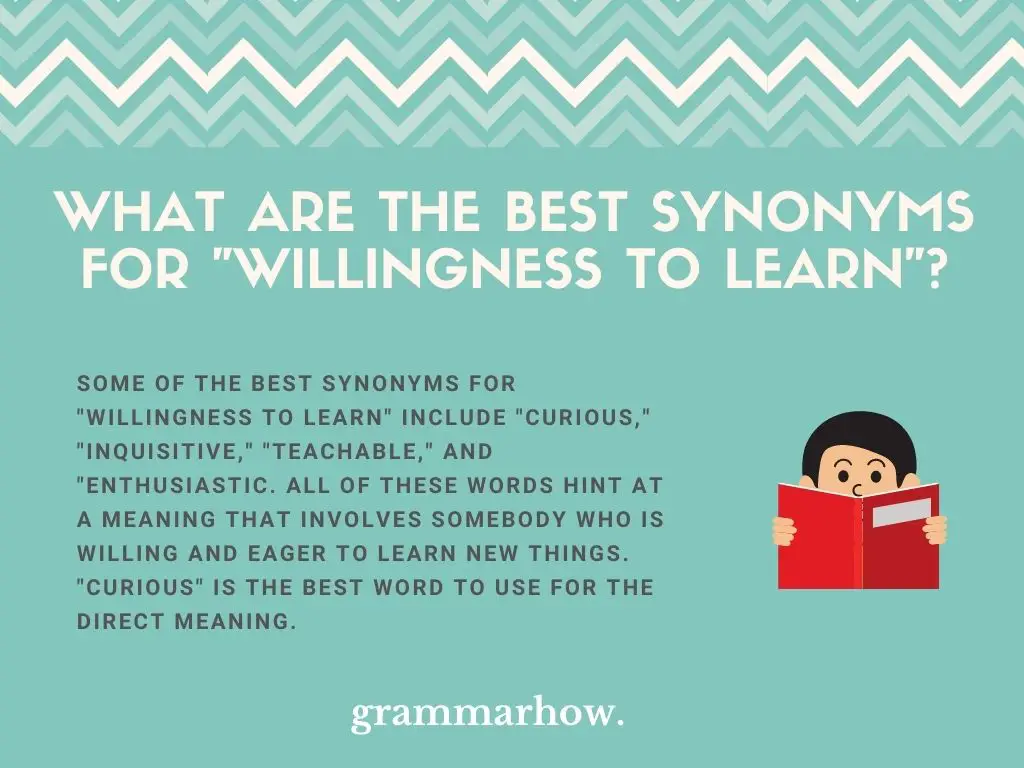Finding the correct word for eager to learn doesn’t have to be a challenge. It’s great to expand your vocabulary and broaden your knowledge if you can put a word to a description. In this article, we’ll look at good words for a willingness to learn and how to use them.
What Are The Best Synonyms For “Willingness To learn”?
Some of the best synonyms for “willingness to learn” include “curious,” “inquisitive,” “teachable,” and “enthusiastic. All of these words hint at a meaning that involves somebody who is willing and eager to learn new things. “Curious” is the best word to use for the direct meaning.
According to The Cambridge Dictionary, the definition of “curious” is “interested in learning about people or things around you.”
So, in this article, we’ll look at the following words and how they relate to the phrase “willingness to learn:”
- Curious
- Inquisitive
- Teachable
- Enthusiastic
Curious
“Curious” is by far the most compatible word with the meaning we’re looking for. You can use it to mean precisely that somebody is willing to learn about something.
Someone that is “curious” is interested in learning new things. Those things can be about people or things, and the curious person is always interested to find out more.
For the most part, “curious” is a positive adjective we can use to describe somebody who is willing to learn new things. It’s a great way to use a quick and easy word to convey your meaning.
- I’m curious about history, so I asked my teacher for more textbooks.
- He was curious about what was inside the cave and found some amazing things.
- My children have always been curious souls. They’re constantly finding new things to entertain themselves with.
- You’re a curious being, aren’t you!
As you can see, “curious” is a great word to use when talking about somebody who is willing to learn all about new things. You’ll usually use it in a positive way, though that isn’t always the case.
Sometimes, “curious” is used as a negative adjective. That means that people might call someone “curious” who’s a little too eager to learn about new things. While it’s usually good to be happy to learn about things, some people go overboard and put themselves in danger to learn.
You may have heard the old idiom:
- Curiosity killed the cat.
It’s this idea that sometimes lets “curious” be painted in a negative light.
Inquisitive
Next, we want to talk you through “inquisitive.” It’s another great synonym to use and is definitely up there with “curious.” Many people like to use “inquisitive” as a way to talk about somebody who is willing to learn.
“Inquisitive” means that somebody wants to discover and explore new possibilities. They always have a thirst to try new things and won’t rest until they’ve satisfied that thirst.
According to The Cambridge Dictionary, the definition of “inquisitive” is “wanting to discover as much as you can about things.”
Just like “curious,” “inquisitive” comes with both positive and negative connotations. For the most part, it’s a very positive adjective that you can use to describe somebody who is willing to learn all kinds of new things about the world and the people around them.
- I like to be inquisitive about new things and don’t stop learning until I’ve mastered them (which will never happen)!
- He’s so inquisitive about things. You honestly will never beat him at a strategy game.
- You’re the most inquisitive person I’ve ever met. You’ll find a way to appeal to the masses.
- He’s far too inquisitive to be kept here at the office! You need a grander job that appeals to your capabilities.
“Inquisitive” is a great word to use to talk about somebody who is willing to learn. Usually, “inquisitive” people are slightly more impressive than “curious” people because they often have a tactical thought process or are capable of more critical thinking skills.
Generally, “inquisitive” people are also “intelligent” people, while “curious” people might simply be interested in learning new things.
However, “inquisitive” can also be used negatively. You might find yourself calling someone “too inquisitive” when their eagerness to learn about new things annoys you.
In fact, The Cambridge Dictionary definition in full looks like this:
- wanting to discover as much as you can about things, sometimes in a way that annoys people
Teachable
“Teachable” is another great word to use as a replacement to “willingness to learn.”
“Teachable” is used as an adjective to mean that somebody is capable of being taught new things. It usually implies that they’re willing to learn all about new things, making them an easy candidate to teach.
According to The Cambridge Dictionary, the definition of “teachable” is “able to be taught; that can be taught.”
Most of teaching works better when the people you’re teaching are receptive to what you’re saying. If they’re intent on listening and learning, then someone will have a much better time learning from you. It’s these teachable people that make it worthwhile to be a teacher.
- He’s such a teachable student; I couldn’t ask for someone better!
- You’re so teachable. I always have fun studying and teaching with you.
- My teacher said I’m a teachable pupil.
Enthusiastic
Finally, let’s look at “enthusiastic.” This is a great synonym to use, but it doesn’t always relate to a willingness to learn. Enthusiasm can extend to a wide variety of things in life.
“Enthusiastic” means that somebody is eager to do new things. It doesn’t always have to be learning. You can be enthusiastic about a new hobby or a new sport.
According to The Cambridge Dictionary, the definition of “enthusiastic” is “showing enthusiasm.” This means that someone is eager to learn all about new things.
- I’m an enthusiastic person when I’m introduced to new ideas.
- They’re so enthusiastic, and I can’t believe how happy they are to learn about such a boring subject!
- You’re so enthusiastic about school all the time!
While it doesn’t strictly refer to a willingness to learn, it can still be used correctly in that context. That makes it an excellent candidate to use as a synonym.
Martin holds a Master’s degree in Finance and International Business. He has six years of experience in professional communication with clients, executives, and colleagues. Furthermore, he has teaching experience from Aarhus University. Martin has been featured as an expert in communication and teaching on Forbes and Shopify. Read more about Martin here.
What adjective (single word) means ‘having/using a willingness to learn’?
asked Jan 5, 2015 at 16:26
UKBUKB
1211 gold badge1 silver badge5 bronze badges
1
I understand you’re looking for a single adjective, and I think «curious» fits the bill nicely (and from a pedagogical perspective curiosity is a key indicator of learner success) but I would like to add the following to the mix because I think it shows, if not willingness, at least readiness or capability, and it might be worth something to you:
fertile mind
From Collins:
fertile mind: One that is capable of sustaining, supporting, growing and developing mental thought interjection, especially among the very young.
answered Jan 5, 2015 at 16:54
Rusty TubaRusty Tuba
5,90514 gold badges36 silver badges55 bronze badges
How about curious?
- having a desire to learn or know more about something or someone
- marked by desire to investigate and learn
- eager to learn or know; inquisitive.
Or inquisitive ^
answered Jan 5, 2015 at 16:37
EFrogEFrog
6073 silver badges8 bronze badges
Having a willingness and capacity to learn is teachability:
teachable adj.
Capable of being taught: teachable skills.
Able and willing to learn: teachable youngsters.
teach′a·bil′i·ty, teach′a·ble·ness n. teach′a·bly adv.
American Heritage® Dictionary of the English Language, Fifth Edition.
Copyright © 2011 by Houghton Mifflin Harcourt Publishing Company.
Published by Houghton Mifflin Harcourt Publishing Company. All rights
reserved.
answered Jan 5, 2015 at 18:01
Edwin AshworthEdwin Ashworth
74.4k11 gold badges138 silver badges235 bronze badges
Three excellent non-idiomatic words have already been suggested, curious, inquisitive, and teachable, but my intuition is that English lacks a word with your precise definition.
I believe that the idiom «thirst» is what you are seeking. «Thirst for knowledge» is a borderline cliche, but it is still evocative and clear, and I think many people would define it as a «willingness (or desire) to learn». (For the close connection between «will» and desire» see the interesting discussion, “Make of that what you will” – meaning of “will”.)
answered Jan 5, 2015 at 23:08
hunterhoganhunterhogan
2,2459 silver badges23 bronze badges
There isn’t a single word in English that would fit. Generally, «eager to learn» would be used.
answered Jan 5, 2015 at 16:27
«Enthusiastic» is the best word that comes to mind for me. Doing is sort of like learning, so it is similar enough.
macraf
2,7209 gold badges25 silver badges36 bronze badges
answered Jan 5, 2015 at 21:03
kns98kns98
3801 silver badge5 bronze badges
Maybe you’re entering the workforce for the first time and you don’t have much experience or skills under your belt. Or, perhaps you’re looking to dive into a new field of work mid-career. Maybe your industry is rapidly changing, necessitating that you learn new skills or technologies all the time. Whatever the reason, you’re short on the skills needed for the job you want. How can you let your future employer know that you’re willing to learn new skills and be trained?
Don’t worry, there are a number of ways you can do this. Check out the resume writing tips below and choose the one that best fits your circumstances.

Photo, J. Kelly Brito.
Why Willingness to Learn Looks Good on Your Resume
In industries that involve rapidly changing technologies——for instance, medicine or computer programming——employees must be agile and willing to adapt. They must constantly learn new skills in order to keep up with the competition. That willingness is a vital quality.
Even in other fields, willingness to learn is a good thing. For example, a construction foreman may look for employees that are willing to learn the company’s preferred methods, rather than being stuck on the ways they’ve worked in other circumstances.
Some job listings may even include willingness to learn as a requirement.
Additionally, a willingness to learn can be a plus when you are first entering the workforce. Hiring managers don’t expect entry-level employees to have all the skills and experience they’ll need to get the job done. But they do want someone who is attentive and ready to learn.

Photo, Krzysztof Maksimiuk.
Sometimes, you may want to say it outright. At other times, you can demonstrate your willingness to learn through your experiences or descriptions. Find out the best ways to say that you’re willing to learn on your resume.
Use a Resume Summary
You can use a direct approach by stating your willingness to be trained in the resume summary. The resume summary is located at the top of your resume, below your contact information and above your work experience and education.
If your experience and education aren’t a perfect match for the job, you can be forthcoming about it in the resume summary. You’ll also want to highlight your strengths, including your willingness to learn.
Your resume summary might read something like this:
A self-motivated [previous job title] who is willing to learn new techniques and best practices in order to keep [company’s name] operating ahead of the competition.
Check out this article for more information on how to write your resume summary.
This is also important if you are a student entering the workforce for the first time. We’ll discuss student resumes in more detail below.

Photo, Daria Nepriakhina.
Use a Skills Summary
A skills summary is like an expanded skills list that includes descriptions. You can use the description space to highlight how you’ve used a growing skillset in your career. For example, if you’re a computer programmer, you can talk about software and hardware. If you’re a doctor, discuss innovating techniques. Both of these show that you continue learning without saying so outright.
Include Certifications or Continuing Education
When you list certifications or other credentials on your resume, it shows that you were willing to learn the necessary skills to gain them; after all, most certifications require testing to prove you know the subject. The same is true of continuing education. Employers realise that much of this education comes at the expense of your own personal time, proving real self-motivation and a love of learning.
Use Synonym Keywords
You can also say you are willing to learn without using the words “willing to learn.”
Consider using some of the following keywords in your resume:
– Coachable
– Training
– Innovation
– Mentor/mentorship
– Motivated
– New skills
– Challenges
– Development experiences
– Self-taught

Photo, Adolfo Félix.
Describe Past Accomplishments and Results
In your job descriptions, try to highlight instances when you demonstrated a willingness to learn. For example, would any of the following apply to you?
– Monitored arts and culture news to keep pace with current design trends.
– Pioneered the use of [cite technique, software, or technology].
– Mentored by [cite well-known company or individual]
– Attended [cite industry conference] and thereafter applied [site new skill or technique] to [cite result].
Highlight Academic Accomplishment
If you are a student or recent graduate, you can highlight your academic or even extracurricular pursuits on your resume. Good grades, foreign languages, or other learning-focused endeavours will openly demonstrate your willingness to learn.
In Conclusion
A willingness to learn is a soft skill that is valuable in almost every field of employment. In rare instances, you may state your willingness to learn outright. In others, you can use examples of personal career development, continuing education, or the results of learning new skills to demonstrate your willingness without using the words “willing to learn.”
Furthermore, you can use resume templates to highlight your skills, input information in a readily-made document instead of creating it from scratch and organising the data into sections. Such a template is a great alternative when you don’t want to spend hours creating the resume by yourself or pay someone to do it for you.
What is willingness to learn?
Willingness to learn is essential to behavior that helps you to be successful in your personal and professional life. It means that you are open or seeking out new experiences, and able to learn new skills and information that can improve your performance in life.
Being open to continuous learning shows adaptability to the ever-changing world and environment. It also helps you to continue to develop vital skills and abilities like communication, emotional intelligence, organization, and strategy thinking.
In your professional life, being willing to learn is required to continue your career progression. It is important to continually develop your skills and upgrade your knowledge about the industry you are working in or be up-to-date with the latest trends. Being open to learning new ways of work, procedures, or tools in your workplace can help you to do your job better.
Why willingness to learn is wanted by recruiters on your resume?»?
Employers look for people who can demonstrate a willingness to learn. The workplace is not a constant environment, and each company has its procedures and style of work, that’s why new employees have to be open to learning a new way of working. Being open to learning helps you take on a job quickly.
Being willing to develop your skills can help you get extra responsibilities in the workplace and become a valuable employee.
Employers want to attract skilled professionals, but when job candidates demonstrate that they are open to learning and adapting, they become a better investment for the company.
Demonstrating on your resume that you’re eager and quick to pick up new skills and techniques will help you when it comes to hiring or getting a promotion.
There are many ways to highlight your willingness to learn on your resume. You can provide examples of how you are a self-learner, highlight your dedication to growth, or how you are embracing emerging technologies.
What skills, activities and accomplishments help you highlight your willingness to learn?
Saying that you are willing to learn on a resume is not enough. There are some skills and qualities that you should have to convince the recruiters that you are open to learning new skills. Here is a list of those skills:
- Self-management is the knowledge of what to do and how to act in different situations. It also means that you understand your responsibility in all aspects of your work and know what to do to achieve your task successfully. This skill hints that you can find the need resources or learn more to fulfill your responsibility.
- Adaptability is a skill that suggests that you can adapt to the way other people work and cope with differences in conditions or environment. To do that, you have to be able to learn and improve yourself regularly.
- Inquisitiveness is intellectual curiosity. It is to be curious to learn the explanations for different things about your work or personal life.
- Receiving feedback is part of the communication skillset, but is an essential ability to demonstrate that you are willing to learn and improve your work. It means being receptive to new ideas and different opinions.
How to demonstrate willingness to learn on your resume?
- Highlight on your resume specific results and improves over time.
- Mention and give examples of your willingness to learn in each section of your resume.
- Give an example of skills that are outside the obvious in your industry.
- In addition to demonstrating a willingness to learn, list recent courses and certificates.
Example 1: Demonstrate willingness to learn in the experience section
Date period
-
Increased the company affiliate revenue by 350% in two years. Consistently achieved revenue goals every year, by implementing new strategies, following the latest trends, and learning the best practices
-
Enhanced alignment with brand strategy by leading the redesign of the company shopping portal. Learned essential principles in UX design
-
Boosted conversion by 18% by developing new content strategy
-
Created content for the company webpage pages based on qualitative and quantitative feedback
RIGHT
This Marketing Manager demonstrates their willingness to learn by giving examples of how they improve their work by learning new skills and information.
Employers want to hire people who are up-to-date on the state of the industry and will continue to self-educate as their career progresses.
This example shows how you can demonstrate your abilities by giving a concrete example of your achievements when applying the improved skill you learn on the job.
Example 2: Demonstrate willingness to learn in the resume summary section
What’s the one thing that makes you the best candidate for this job?
RIGHT
You can use a direct approach by stating your willingness to learn in the resume summary. This strongly applies when your expertise is in an area that you must keep up with the latest technologies, industry trends and innovations.
The example provides key qualities of a person who is open and adaptable to their work environment. They stated in the begging that they are self-motivated, which shows their incentive and dedication to do their job.
They are forthcoming about their willingness to learn, which is a good strategy if you are just entering the workforce, or you have little experience.
Example 3: Show your willingness to learn in your achievements sections
Created successful promotional materials for gallery advertising using DIY design platforms, with results that saved 20% of the marketing budget.
Researched the local schools’ art curriculum to organize every year student art contest involving 6 area schools, grades K — 12, held in the gallery. Increased the participants in the art contest by 35%.
Researched incoming artists for each exhibition to create art awareness and networking sessions and organized events for students and the local community. This results in a 40% increased attendance to the gallery exhibitions.
RIGHT
Use the achievement section of your resume to provide examples that prove your ability to learn something new and apply it to make improvements or do your job beyond expected.
The provided example of the achievement section gives you a perspective on how to demonstrate your willingness to learn without actually saying it.
They use action verbs that showcase their willingness to learn a new skill to reduce the company’s expenses or get more information about the topic they worked on to do their job efficiently and successfully.
These examples proved that they are willing to learn, and can engage with tasks outside their educational background.
Example 4: Demonstrate the skill through other sections of your resume
You can demonstrate your willingness to learn in other sections of your resume like volunteer work, certification, and education.
When you list certifications or other credentials on your resume, it shows that you were willing to learn the necessary skills to gain them and want to keep up with the latest trend in your industry.
Willingness to learn: key takeaways for your resume
- A willingness to learn is a soft skill that is valuable in almost every field of employment.
- Being willing to develop your skills can help you become a valuable employee.
- Demonstrate on your resume some other skills that represent a willingness to learn.
- Include on your resume relevant certificates, education degrees, and achievements.
- Show results of learning new skills to demonstrate your willingness without using the words “willing to learn.”
About this report:
Data reflects analysis made on over 1M resume profiles and examples over the last 2 years from Enhancv.com.
While those skills are most commonly met on resumes, you should only use them as inspiration and customize your resume for the given job.
The idea for the Describing Words engine came when I was building the engine for Related Words (it’s like a thesaurus, but gives you a much broader set of related words, rather than just synonyms). While playing around with word vectors and the «HasProperty» API of conceptnet, I had a bit of fun trying to get the adjectives which commonly describe a word. Eventually I realised that there’s a much better way of doing this: parse books!
Project Gutenberg was the initial corpus, but the parser got greedier and greedier and I ended up feeding it somewhere around 100 gigabytes of text files — mostly fiction, including many contemporary works. The parser simply looks through each book and pulls out the various descriptions of nouns.
Hopefully it’s more than just a novelty and some people will actually find it useful for their writing and brainstorming, but one neat little thing to try is to compare two nouns which are similar, but different in some significant way — for example, gender is interesting: «woman» versus «man» and «boy» versus «girl». On an inital quick analysis it seems that authors of fiction are at least 4x more likely to describe women (as opposed to men) with beauty-related terms (regarding their weight, features and general attractiveness). In fact, «beautiful» is possibly the most widely used adjective for women in all of the world’s literature, which is quite in line with the general unidimensional representation of women in many other media forms. If anyone wants to do further research into this, let me know and I can give you a lot more data (for example, there are about 25000 different entries for «woman» — too many to show here).
The blueness of the results represents their relative frequency. You can hover over an item for a second and the frequency score should pop up. The «uniqueness» sorting is default, and thanks to my Complicated Algorithm™, it orders them by the adjectives’ uniqueness to that particular noun relative to other nouns (it’s actually pretty simple). As you’d expect, you can click the «Sort By Usage Frequency» button to adjectives by their usage frequency for that noun.
Special thanks to the contributors of the open-source mongodb which was used in this project.
Please note that Describing Words uses third party scripts (such as Google Analytics and advertisements) which use cookies. To learn more, see the privacy policy.


